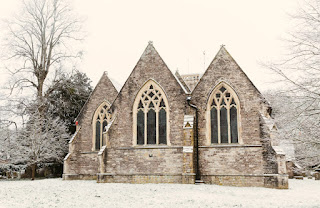'Consider the Communion Service': a Keble Epiphanytide sermon and 'our sacrifice of praise and thanksgiving'
And the more we know and consider the Communion Service, the better we discern, how much of it is taken up with praising God, and giving Him thanks: first of all in the Creed, the Nicene Creed; which, though not in verses, has all the force and meaning of a most glorious and complete Hymn, proclaiming God's glory and His mercy through Jesus Christ, from the beginning to the end. Afterwards, you know, comes a portion of the service, in which we and the Angels present join in the Chant, wherewith the blessed ones in heaven laud and magnify God's glorious Name, evermore praising Him and saying, "Holy, holy, holy, Lord God of Hosts; heaven and earth are full of Thy glory: Glory be to Thee, O Lord most High." The Angels, always some of them invisibly present in our assemblies, could not join in our penitential service, which comes before this, because they never had any sins to repent of: but in our thanksgivings they may and do join, because they, no less than we, are indebted to the Lord for all that they are, and have. He is their All, as He is ours: and so they help us to praise Him: and our minds being, as one may say, in tune for the very highest notes of praise, we go on to our most sacred act of adoration and homage: the Offering of the Consecrated Bread and Wine to God the Father. Which being concluded, we presently break into an earnest prayer to Him that He would, "of His fatherly goodness, mercifully accept that our sacrifice of praise and thanksgiving:" and then we lift up our voices to Him in another hymn, "Glory be to God on high, and in earth peace, good will towards men;" the same which the Angels sang on earth to the shepherds, the night our Lord was born. And many, I doubt not, have noticed, and it is a comfortable thought, how nearly in that part of the service we copy our Master's doings at the end of the first Eucharist; for then, it is written, "when they had sung an hymn, they went out;" they went out into the Mount of Olives, to do and suffer all that God's mysterious Providence had appointed, or decreed to permit.
Once again we see here clear expressions of Old High piety in Keble's preaching. Above all, of course, is the reverence for the Book of Common Prayer. Particularly noticeable in this extract is an affection for and confidence in the Prayer Book's Eucharistic rite and, in stark contrast with many Ritualists, no sense whatsoever that this order was insufficient or lacking. Similarly, Keble is perfectly content to employ language which would dismissed as entirely insufficient by later Anglo-catholics: "the Communion Service". Also in the sermon he indicated, very much in Old High fashion, how 'reformed' and 'catholic' terminology were complementary, not contradictory: "in all ages, the Holy Supper has been called the Eucharist. Finally, there is the issue of the offering of the consecrated Bread and Wine in the Prayer of Consecration. Rather than being a Tractarian innovation, this was a view with deep roots in Laudian and High Church thought, in which the offering of the consecrated Bread and Wine was integral to the Eucharist as commemorative sacrifice. Taylor, for example, declared:
I mean it in the matter of sacrificing; which also is true in the most mysterious solemnity of Christianity in the holy Sacrament of the Lords Supper, which is hallowed and lifted up from the common bread and wine by mystical prayers and solemn invocations of God.
Likewise, Brevint, in The Christian Sacrament and Sacrifice (1673), a work influential in the Church of England throughout the 'long' 18th century:
the Bread and Wine to be used at the Celebration of Christ's Death: which Bread in the Communion, considered as Sacrament, signifies the natural; but considered as Sacrifice, it represents the mystical Body of Christ, that is, his Church.
What is more, in classic Laudian and High Church fashion, Keble views this offering as defined by the post-Communion Prayer of Oblation.
(The picture is of Keble's parish church, All Saints, Hursley, Hampshire.)




Comments
Post a Comment